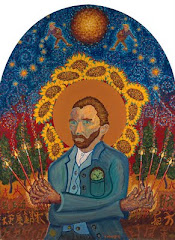“...your golden Hair Margarete”
I think I may turn into this man sometime soon, if I am not him already.
Klediments:
I bought Roman Vishniac’s book “A Vanished World” at a used bookstore today, it was a steal at 2 bucks. Vishniac traveled throughout Eastern Europe taking pictures of Jews in Poland, Lithuania, Russia, etc., just before WW II and the holocaust; indeed a vanished world.
Poem of the week comes with a picture that Lynda took of me late one night last week. I was painting outside in the dark, in the cold mist (I don’t have anywhere inside to paint this big). It is another in a series of reproductions of the eroding/disappearing symbols on the walls at the death camp Auschwitz/Birkenau. Sometimes I paint exact copies of the walls to preserve the names, art, poetry, messages, and prayers that still remain. Sometimes, like in this painting, I use some original material written on or carved into the walls and then add some of my own images and reflections or words, phrases, and poetry from people like Hannah Arendt, Mother Maria Skobtsova, Simone Weil, etc., and this poem below by Paul Celan.
Death Fugue:
Black Milk of Daybreak we drink it at evening
we drink it at noon and morning we drink it at night
we drink and we drink
we dig at a Grave in the Air there one lies unconfined
A Man lives in the House he plays with the Serpents he
writes
he writes while it falls dark over Germany your golden
Hair Margerete
he writes and steps from the House and they’re shining the Stars he
whistles his Jews up to dig at a Grave in the Earth
he commands us to strike up the Dance.
...A Man lives in the House he plays with the Serpents he
writes
he writes while it falls dark over Germany your golden
Hair Margerete
Your ashen Hair Shulamith we dig at a Grave in the
Air there one lies unconfined
He cries dig the soil deeper you there you others sing out and
play
he grabs the Steel at his Belt he waves it his Eyes are
blue
dig your Spades deeper you there you others play on for
the Dance
Black Milk of Daybreak we drink you at night
we drink you at noon and morning we drink you at evening
we drink and we drink
a Man lives in the House your golden hair Margarete
your ashen Hair Shulamith he plays with the Serpents
He cries play Death more sweetly Death is a Master from
Germany
He cries stroke the Strings more darkly you’ll rise like Smoke in
the Air
then a Grave you’ll have in the Clouds there one lies unconfined
Black Milk of Daybreak we drink you at night
we drink you at noon Death is a Master from
Germany
we drink you at evening and morning we drink and we drink
Death is a Master from Germany his Eye is blue
he strikes you with leaden Bullets he strikes you true
a Man lives in the House your golden Hair Margarete
he sets his Dogs onto us and he grants us a Grave in the Air
he plays with the Serpents and dreams Death is a Master
from Germany
your golden Hair Margarete
your ashen Hair Shulamith

Dinosaurs in the Garden of Eden? “Whatever debases the intelligence degrades the entire human being.” Simone Weil, Letter, March 30, 1936.).
Is there such a thing as “Jewish Science,” Steven Gimbel asks in his book, “Einstein's Jewish Science: Physics at the Intersection of Politics and Religion.” That is, could we say that there is something about Jewish culture (in a most comprehensive sense) that enabled Einstein to discover the theory of general relativity? “Jewish science” is the term that fundamentalist nazi’s used for Einstein’s theories. But the nazi’s rejected the theory of relativity not because they questioned it on logical scientific grounds, but they rejected it on the ideological grounds that Einstein was Jewish (are we moving towards a time where there will be something like “evangelical christian science?” or “republican science”).
In his review George johnson writes: “It’s no wonder Nazis hated relativity. They lived in a world of absolutes. There was a master race with one true religion and one true language, with a music and literature that celebrated its glory. There was a true German empire, sliced up by the arbitrary boundaries of concoctions called nation-states. With absolute might the Fatherland would regain its proper position in space and time.” Nazi Scientist Phillip Lenard argued: “The Jew wants to create contradictions everywhere and to separate relations, so that preferably, the poor naïve German can no longer make any sense of it whatsoever.” This kind of political, ideological, and race based rejection of science should not seem unfamiliar to us today.
Those of us studying the Talmud (and who participate in Daf Yomi) understand that the heart of the Talmudic view is that there is absolute truth, but that this truth is not directly and completely available to us in it’s fullness (another aspect of tzimtzum). Einstein’s proposition is that “...from our blinkered perspective we see qualities called space and time. But in relativity theory, the two can be combined mathematically into something more fundamental: a four-dimensional abstraction called the space-time interval. Time and space vary according to the motion of the observer. But from any vantage point, an object’s space-time interval would be the same — the higher truth that can be approached only from different angles.”
It’s just this kind of “relativism” and mind-stretching questioning that enrages many kinds of fundamentalists who too often choose to believe convenient and simple lies rather than complex and difficult truths. Then again, no matter how simple Jesus made the Gospel for us (i.e. “love your enemies”) we just refuse to believe that that is just what Jesus wanted us to do! The Gospel could be called something like “Jewish Science for Dummies” (but that may be given us too much credit!).

However, an Italian scientific study found that penises are on average around 10 percent smaller today than 50 years ago. The study cited weight gain, pollution, stress and smoking as possible factors in the shrinkage. But Rush Limbaugh on reading about the study characteristically stressed the evil power and potency of feminism on penis size in his radio show. Rush claimed that the shrinkage should be attributed to feminists (“feminazis” as he puts it) who have the power to determine the size of male genitalia. Scoffing at the idea that air pollution might influence one’s dickishness, he stated, “I think it’s feminism… it’s tied to the last 50 years — the average size of [a male's] member is 10 percent smaller than 50 years — it has to be the feminazis, the chickification and everything else” (The article doesn’t mention it but perhaps the male brain has shrunk by 10% as well?).
“Whatever debases the intelligence degrades the entire human being” (Simone Weil).
When the first cro-magnon human drew a picture of the sun on a wall, the cave became a church and that artist became a priest, and then the hunters feared her because she took for herself some of their power. And so the hunters came to her before every hunt to bless them. She drew pictures of the hunters, and then drew a great beast on the wall with a spear through it’s heart, then she drew the people dancing and feasting; and the hearts of the hunters were filled with courage and the hearts of the people were at peace. But when the beast escaped or some hunters were killed and the people went hungry then the priest proved just how much power she really wielded! I am an artist, but art can be a way of claiming power over the imagination of those who fear, over those who rule, over the god of nature, even over death. That is the great temptation that the artist should resist. The artist must let death end the artist’s will to power and break her hold on simulacra and illusion. Is there an impulse behind every simple snapshot we take that is a will to power and a denial of death? Say cheese.
“Whatever debases the intelligence degrades the entire human being” (Simone Weil).
This brings us to the “Malleus Maleficarum,” or the "Der Hexenhammer” (available on-line here: http://digital.library.cornell.edu/cgi/t/text/text-idx?c=witch;cc=witch;view=toc;subview=short;idno=wit060 ) which I have mentioned before. It is a treatise on the discovering and prosecution of witches, written in 1486 by Heinrich Kramer, a German Catholic clergyman and first published in Speyer, Germany in 1487 (see wiki). Basically Kramer traveled throughout Germany teaching form his handbook on how to hunt, capture, prosecute, punish, and kill witches. It was the Wikipedia of the inquisition for the 15th to the 17th centuries.
In Chapter VII. Titled: “How, as it were, they [women/witches} Deprive Man of his Virile Member,” is an expansive section on the phenomenon of ‘disappearing penises’ (could Rush be on to something?). There are some cases recorded where all the men in a particular town would have there penises disappeared! Here are some narrations from the MM by a ‘venerable Father from the Dominican House of Spires,’ a man well known in the Order for the honest of his life and for his learning. "One day," he says, "while I was hearing confessions, a young man came to me and, in the course of his confession, woefully said that he had lost his member. Being astonished at this, and not being willing to give it easy credence, since the opinion of the wise it is a mark of light−heartedness to believe too easily, I obtained proof of it when I saw nothing on the young man's removing his clothes and showing the place. Then, using the wisest counsel I could, I asked whether he suspected anyone of having so bewitched him. And the young man said that he did suspect someone, but that she was absent and living in Worms. Then I said: 'I advise you to go to her as soon as possible and try your utmost to soften her with gentle words and promises'; and he did so. For he came back after a few days and thanked me, saying that he was whole and had recovered everything. And I believed his words, but again proved them by the evidence of my eyes” (now I rightly pass for a Roman Catholic, but am I the only one that thinks that if an outbreak of disappearing penises occurs that maybe priests in confessionals are not the ones who should be in charge of the examinations?).
Now a great deal of discussion in the MM occurs around whether “...such members are really torn right away from the body,” or if they are merely “hidden by the devil through some prestidigitory art so that they can be neither seen nor felt.” Either way, it seems that torturing, drowning, and burning women usually offered an effective remedy for disappeared penises (whether the same thing will work for a more gradual shrinkage the Hexenhammer doesn’t say, so perhaps we should wait for fundamentalist christian scientists to weigh in on this before actually burning anybody).
The MM continues: “..and what, then, is to be thought of those witches who in this way sometimes collect male organs in great numbers, as many as twenty or thirty members together, and put them in a bird's nest, or shut them up in a box, where they move themselves like living members, and eat oats and corn, as has been seen by many and is a matter of common report? It is to be said that it is all done by devil's work and illusion, for the senses of those who see them are deluded in the way we have said. For a certain man tells that, when he had lost his member, he approached a known witch to ask her to restore it to him. She told the afflicted man to climb a certain tree, and that he might take which he liked out of the nest in which there were several members. And when he tried to take a big one, the witch said: You must not take that one; adding, because it belongs to a parish priest.”
“From each according to their ability, to each according to their need,” apparently not, so at least these witches don’t appear to be Marxists.
The photo above is of three members of Pussy Riot awaiting trial in Russia for blasphemy and hooliganism in an Orthodox Church (but can a ‘church’ be defiled from the outside? ). Yet the Orthodox Church in Russia is growing in power, wealth, and influence. But in Europe and america a constant lament from church authorities is the decline of their members.
“A Vanished World” Indeed.
“your golden Hair Margarete
your ashen Hair Shulamith”
(btw, Shulamith is Hebrew for Solome).
Obliged.


















